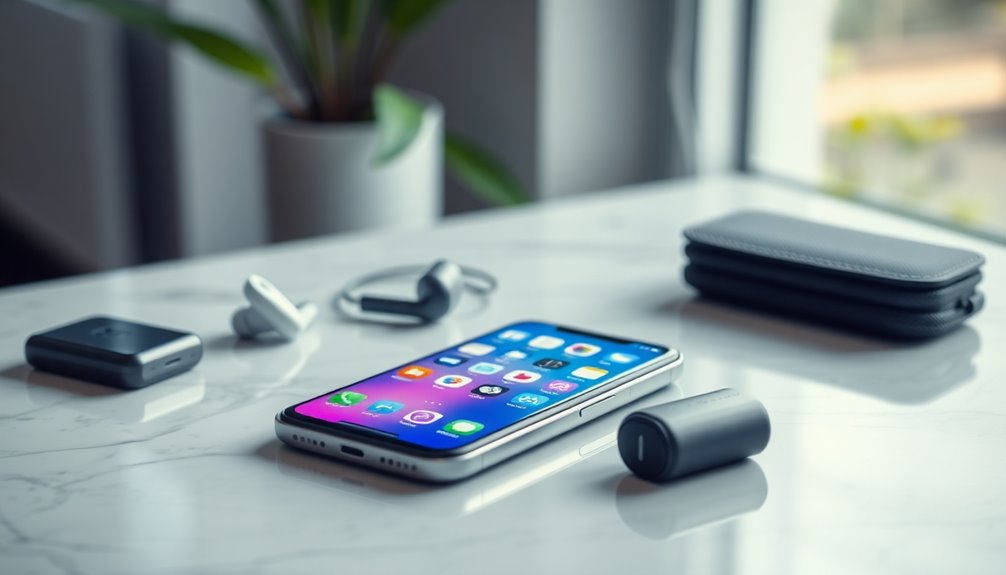I've looked into Osphena, and it's aimed at helping postmenopausal women deal with painful intercourse. While it can improve sexual comfort, it comes with potential risks, like stroke and endometrial cancer, which is concerning. I've seen mixed user experiences; some women appreciate the benefits, but others struggle with side effects such as hot flashes or mood swings. It's important to talk with your doctor about whether Osphena is right for you, considering your health. There are also alternatives available that might suit you better, and exploring these options could be beneficial for your situation.
Key Takeaways
- Osphena is FDA-approved for postmenopausal women with dyspareunia but carries serious risks like endometrial cancer and stroke.
- Common side effects include hot flashes, weight gain, and mood swings, which may lead to discontinuation.
- Long-term safety and effectiveness of Osphena remain uncertain, especially for women over 70.
- Alternative treatments like Estrace vaginal cream and natural remedies exist for managing vaginal dryness.
- Societal stigma around older women's sexual health contributes to a lack of open dialogue and awareness.
Understanding Osphena's Function
When it comes to understanding Osphena's function, it's significant to know that this medication specifically targets postmenopausal women dealing with painful intercourse, or dyspareunia.
I found out that Osphena works by acting as an estrogen agonist/antagonist, meaning it mimics some effects of estrogen in the body. This is vital for women like me, who experience discomfort due to low estrogen levels and conditions like vulvovaginal atrophy.
I appreciate that it was FDA-approved in 2013, aiming to raise awareness about our sexual health.
While it can be a game-changer, costing about $90 for a 90-day supply, it's important to weigh its potential benefits against any concerns I might have.
Understanding its purpose helps me make informed decisions about my health.
Potential Risks and Side Effects

Steering through the potential risks and side effects of Osphena is vital for anyone considering this medication. While it aims to alleviate painful intercourse, it carries significant risks.
I've learned that Osphena has a black box warning from the FDA, indicating serious concerns like endometrial cancer, stroke, and deep vein thrombosis. Common side effects include hot flashes, weight gain, and mood swings, which I find concerning.
Some women also report increased vaginal discharge and abdominal cramps. What's equally troubling is the uncertainty surrounding its long-term safety and effectiveness. Additionally, women over 70 should consider individualized decision-making regarding their health and any new medications.
It’s important to weigh these potential drawbacks against the benefits before deciding if Osphena is right for you. Always consult with your healthcare provider to guarantee informed decision-making. Additionally, it may be beneficial to consider how your overall health and personal circumstances could influence the effectiveness and suitability of Osphena. Factors such as age, existing medical conditions, and lifestyle can play a significant role in treatment outcomes. Moreover, for those navigating the complexities of healthcare expenses, understanding concepts like social security means testing explained can provide valuable insights into financial assistance options that may ease the burden of medication costs.
User Experiences and Feedback

Despite the potential risks and side effects associated with Osphena, many women have shared their experiences with the medication, revealing a spectrum of outcomes.
Here's what I've gathered from their stories:
- Some women report a significant improvement in sexual comfort and a renewed sense of intimacy.
- Others, however, experienced frustrating side effects, such as hot flashes and decreased libido, leading them to stop the medication.
- Many feel that more awareness is needed about the sexual health issues older women face.
Navigating Osphena's benefits and drawbacks can be challenging.
It's crucial to weigh these experiences carefully, as they highlight the complexities of addressing sexual health after menopause.
Listening to fellow users can guide us in making informed decisions.
Available Alternative Treatments

Exploring alternatives to Osphena can provide valuable options for those seeking relief from vaginal dryness and painful intercourse.
I've found that Estrace vaginal cream is a popular choice since it directly targets vaginal tissue, offering a more localized treatment. In addition, intrarosa suppositories and Vagifem are effective alternatives that many women consider.
For those interested in natural remedies, coconut oil can help with dryness, and some women have turned to zinc and B vitamins to support overall health.
It's crucial to connect with other women in supportive communities, as sharing experiences can lead to discovering non-pharmaceutical options that work for you.
Always consult your healthcare provider before starting any new treatment to verify it's safe for your specific situation.
Societal Attitudes Toward Sexual Health

Societal attitudes toward sexual health, especially for older women, often reflect a troubling stigma that can leave many feeling isolated and unheard.
It's frustrating to see how this stigma persists, affecting our conversations and choices regarding health.
- Many women feel embarrassed discussing their sexual health issues, leading to silence.
- There's a pervasive belief that older women should be asexual, ignoring their needs and desires.
- The lack of representation in media only deepens the feeling of invisibility.
It's essential for us to challenge these outdated perceptions and foster an environment where open dialogue about sexual health is normalized.
We deserve to feel empowered and supported in our sexual well-being, regardless of our age.
Importance of Community Support

Community support plays an essential role in addressing the often-overlooked sexual health issues faced by older women.
I've found that sharing my experiences with others in similar situations can be empowering. Many of us feel embarrassed or isolated when dealing with sexual discomfort, but discussing these challenges openly helps normalize the conversation. Additionally, many women may experience emotional challenges due to narcissistic behavior in past relationships, which can impact their overall well-being. Understanding the physical effects of narcissistic abuse can provide insight into our health struggles. Engaging in open dialogues about our experiences can also foster deeper connections and understanding among women facing similar issues. Furthermore, maintaining good oral hygiene habits is crucial for overall health, especially as we age.
Joining online forums or local support groups has made me realize I'm not alone in this journey. We can exchange valuable information about alternatives to medications like Osphena, and it's comforting to know others understand our struggles. Additionally, studies suggest that regular tea consumption can enhance cognitive function, providing a natural way to support mental health during challenging times.
Ongoing Research and Awareness

Sharing experiences in support groups has highlighted the pressing need for ongoing research and awareness surrounding the sexual health of older women.
We can't ignore the challenges we face or the importance of understanding how medications like Osphena affect our bodies.
Here are some key points to reflect on:
- Many women still face stigma and discomfort discussing sexual health, making awareness vital.
- Ongoing studies are essential to guarantee safety and efficacy for long-term users.
- We need more alternatives that prioritize natural remedies with fewer side effects.
- Additionally, understanding the rules and regulations surrounding health-related treatments can empower women to make informed decisions about their care.
Frequently Asked Questions
How Does Osphena Compare to Hormone Replacement Therapy?
I've found Osphena to be a different approach than hormone replacement therapy. While it targets painful intercourse, HRT addresses broader symptoms of menopause. Each option has its pros and cons, so I'd recommend discussing both with your doctor.
Can Osphena Be Used With Other Medications Safely?
I've found that Osphena can interact with other medications, so it's essential to consult with my healthcare provider before combining treatments. They'll help guarantee it's safe and effective for my specific health needs.
What Should I Do if I Miss a Dose of Osphena?
If I miss a dose of Osphena, I take it as soon as I remember unless it's almost time for the next one. Then, I skip the missed dose and continue my regular schedule.
Is Osphena Effective for Women Who Are Not Postmenopausal?
I've found that Osphena primarily targets postmenopausal women. For those not postmenopausal, its effectiveness isn't well-studied. I recommend discussing alternatives with your healthcare provider to find a suitable option for your needs.
How Should Osphena Be Stored and Handled?
"Better safe than sorry." I store Osphena in a cool, dry place, away from light and moisture. I guarantee it's out of reach of children and always check the expiration date before using.
Conclusion
As we navigate the delicate landscape of aging, understanding our bodies and choices becomes vital. Osphena may offer a beacon of hope for some, but it's important to weigh its risks against its benefits. Just like a garden, our sexual health needs nurturing and care, and we must cultivate conversations free from shame. Together, let's break the silence and support each other in finding the right path to intimacy, ensuring every woman blooms in her own time.








